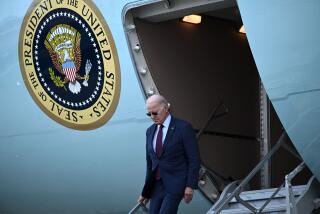Jostling to claim populist turf
He knocks CEOs who “dump” employee pensions while “pocketing bonuses.” He laments Maytag workers who “labored all their lives only to see their jobs shipped overseas.” He recalls humble beginnings and says his experience is “rooted in the lives of the people.”
That kind of hard-driving populism has formed the core of John Edwards’ campaign for president. But those words have come this week from Barack Obama -- one of Edwards’ chief rivals for the Democratic nomination -- who has recalibrated his campaign to appeal to working-class voters before Thursday’s caucuses.
With Iowa’s first-in-the-nation nominating event looming, Obama has shifted away from his almost singular emphasis on transcending Washington’s partisan divisions -- a message that appeals to upper-income and independent voters who form a minority of caucus-goers. Instead, he is aiming for the working-class voters who are the party’s core, and who have been moving to Edwards in growing numbers over the last few weeks.
The two candidates’ campaign speeches and advertising sound nearly identical now -- stressing the needs and struggles of working people and the desire for change.
And each man is attacking the other’s populist credentials -- often chiding one another more than they do Hillary Rodham Clinton, the national front-runner, who remains locked in a tight race in Iowa. The New York senator has built her base on a foundation of older voters and women.
“It’s the race within the race,” said Democratic strategist Chris Lehane, a former Clinton White House aide who is not working on a campaign. “Hillary has a block of demographics that is more identifiable, but Obama and Edwards are still vying for votes between themselves.”
Obama’s focus on the former North Carolina senator became apparent last week, when he criticized Edwards for ads on his behalf that have been paid for by a labor-union-affiliated political committee.
Edwards long has criticized the influence of such organizations, and Obama was seeking to undermine Edwards’ claim of being a Washington outsider who would fight special interests.
Then Obama, a supporter of free trade, launched a television ad in Iowa that talked about the devastation left by an American business that moved its plant to China.
The shift came into even sharper view Friday as both men crisscrossed Iowa. They even made simultaneous, late-afternoon stops in the working-class town of Clinton.
“You’ve got CEOs making more in 10 minutes than workers make in an entire year,” Obama said.
For his part, during a campaign stop in Dubuque, Edwards blasted a political system hijacked by “a small band of profiteers that has sold out America in selfish service of their greed and power.”
Earlier in Williamsburg, Obama talked about his conversations with former Maytag workers who now find themselves competing with teenagers for low-paying jobs at Wal-Mart -- a reference to a shuttered plant in Newton, where Edwards had walked a picket line with workers.
And in comments reminiscent of Edwards’ tale of his modest, mill-town upbringing, Obama told hundreds packed into a junior high school gym in tiny Coralville, how he had been raised by a single mother. His grandmother, he said, lives in a tiny African village without heat or running water.
Obama’s shift comes amid an overall tightening in the Democratic race. Recent surveys show the Illinois senator has gained strength in Iowa and other early-voting states, and he has received high marks for espousing new ideas and promising to change the nature of politics.
But Obama faces a balancing act.
His previous theme of bridging partisan divides plays well among politically moderate independent voters, who could prove decisive in New Hampshire’s Jan. 8 primary. But a Democratic caucus in Iowa -- an agricultural and manufacturing state -- requires a more partisan, working-class appeal. Strategists believe Obama must win at least one of those states, if not both, to remain viable for the nomination.
In shifting his focus to Edwards, Obama in effect is acknowledging that Edwards poses a major threat. In recent weeks, Edwards has been gaining ground among the same undecided middle- and working-class voters that Obama was hoping to attract.
A Times/Bloomberg survey this week showed that Edwards has moved from third place in September to first among likely Iowa Democratic caucus-goers whose annual household income is under $40,000. Obama gained some in that group -- moving from 23% to 27%. But Edwards now wins about one-third of those voters, compared with just 19% who favored him during The Times’ last Iowa poll in September.
The new survey revealed some of Obama’s other vulnerabilities in trying to win working-class voters. When asked which candidate was best able to handle issues of trade, the economy and healthcare, Democratic voters ranked Obama a distant third in each category.
Just 16% of likely caucus-goers said Obama would be best at handling the economy, compared with 42% for Clinton and 26% for Edwards.
With their focus on populism, both Obama and Edwards are trying to close that gap before Thursday night’s caucuses -- looking for the right message to attract undecided voters like Richard Burroughs, 67, of Guttenberg.
He drove nearly an hour on snow-covered roads Friday to hear Edwards speak. The retired John Deere worker, who long ago ruled out voting for Clinton, said he was impressed by Edwards but still can’t make up his mind.
“I like Obama and I like Edwards,” he said. “They both are headed in the right direction, trying to bring some support and benefits back to the average American, to the middle class. If the middle class is doing well, the whole country’s doing well.”
There was one sign Friday that Obama’s populist emphasis was having the desired effect -- at least with union pipe-fitter Ken Koehler, 36, who saw Obama speak in the town of Clinton.
Even though he was leaning toward Edwards, Koehler said, he was a little more likely to change his mind after seeing Obama.
“I’m still on the fence,” he said. “I’m really paying attention.”
--
maria.laganga@latimes.com
seema.mehta@latimes.com
Wallsten reported from Des Moines and LaGanga and Mehta from Clinton. Times associate polling director Jill Darling in Los Angeles contributed to this report.
More to Read
Get the L.A. Times Politics newsletter
Deeply reported insights into legislation, politics and policy from Sacramento, Washington and beyond. In your inbox three times per week.
You may occasionally receive promotional content from the Los Angeles Times.








